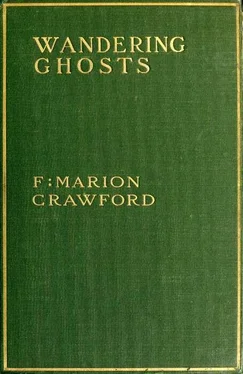F. Crawford - Wandering Ghosts
Здесь есть возможность читать онлайн «F. Crawford - Wandering Ghosts» весь текст электронной книги совершенно бесплатно (целиком полную версию без сокращений). В некоторых случаях можно слушать аудио, скачать через торрент в формате fb2 и присутствует краткое содержание. Год выпуска: 2012, Жанр: Ужасы и Мистика, на английском языке. Описание произведения, (предисловие) а так же отзывы посетителей доступны на портале библиотеки ЛибКат.
- Название:Wandering Ghosts
- Автор:
- Жанр:
- Год:2012
- ISBN:нет данных
- Рейтинг книги:3 / 5. Голосов: 1
-
Избранное:Добавить в избранное
- Отзывы:
-
Ваша оценка:
- 60
- 1
- 2
- 3
- 4
- 5
Wandering Ghosts: краткое содержание, описание и аннотация
Предлагаем к чтению аннотацию, описание, краткое содержание или предисловие (зависит от того, что написал сам автор книги «Wandering Ghosts»). Если вы не нашли необходимую информацию о книге — напишите в комментариях, мы постараемся отыскать её.
Wandering Ghosts — читать онлайн бесплатно полную книгу (весь текст) целиком
Ниже представлен текст книги, разбитый по страницам. Система сохранения места последней прочитанной страницы, позволяет с удобством читать онлайн бесплатно книгу «Wandering Ghosts», без необходимости каждый раз заново искать на чём Вы остановились. Поставьте закладку, и сможете в любой момент перейти на страницу, на которой закончили чтение.
Интервал:
Закладка:
They didn't talk much, it seemed to me; but in fair weather, when there was nothing to do at night, and one was steering, the other was everlastingly hanging round as if he were waiting to relieve the wheel, though he might have been enjoying a quiet nap for all I cared in such weather. Or else, when one was taking his turn at the lookout, the other would be sitting on an anchor beside him. One kept near the other, at night more than in the daytime. I noticed that. They were fond of sitting on that anchor, and they generally tucked away their pipes under it, for the Helen B. was a dry boat in most weather, and like most fore-and-afters was better on a wind than going free. With a beam sea we sometimes shipped a little water aft. We were by the stern, anyhow, on that voyage, and that is one reason why we lost the man.
We fell in with a southerly gale, southeast at first; and then the barometer began to fall while you could watch it, and a long swell began to come up from the south'ard. A couple of months earlier we might have been in for a cyclone, but it's "October all over" in those waters, as you know better than I. It was just going to blow, and then it was to rain, that was all; and we had plenty of time to make everything snug before it breezed up much. It blew harder after sunset, and by the time it was quite dark it was a full gale. We had shortened sail for it, but as we were by the stern we were carrying the spanker close reefed instead of the storm trysail. She steered better so, as long as we didn't have to heave to. I had the first watch with the Benton boys, and we had not been on deck an hour when a child might have seen that the weather meant business.
The Old Man came up on deck and looked round, and in less than a minute he told us to give her the trysail. That meant heaving to, and I was glad of it; for though the Helen B. was a good vessel enough, she wasn't a new ship by a long way, and it did her no good to drive her in that weather. I asked whether I should call all hands, but just then the cook came aft, and the Old Man said he thought we could manage the job without waking the sleepers, and the trysail was handy on deck already, for we hadn't been expecting anything better. We were all in oilskins, of course, and the night was as black as a coal mine, with only a ray of light from the slit in the binnacle shield, and you couldn't tell one man from another except by his voice. The Old Man took the wheel; we got the boom amidships, and he jammed her into the wind until she had hardly any way. It was blowing now, and it was all that I and two others could do to get in the slack of the downhaul, while the others lowered away at the peak and throat, and we had our hands full to get a couple of turns round the wet sail. It's all child's play on a fore-and-after compared with reefing topsails in anything like weather, but the gear of a schooner sometimes does unhandy things that you don't expect, and those everlasting long halliards get foul of everything if they get adrift. I remember thinking how unhandy that particular job was. Somebody unhooked the throat-halliard block, and thought he had hooked it into the head-cringle of the trysail, and sang out to hoist away, but he had missed it in the dark, and the heavy block went flying into the lee rigging, and nearly killed him when it swung back with the weather roll. Then the Old Man got her up in the wind until the jib was shaking like thunder; then he held her off, and she went off as soon as the headsails filled, and he couldn't get her back again without the spanker. Then the Helen B. did her favourite trick, and before we had time to say much, we had a sea over the quarter and were up to our waists, with the parrels of the trysail only half becketed round the mast, and the deck so full of gear that you couldn't put your foot on a plank, and the spanker beginning to get adrift again, being badly stopped, and the general confusion and hell's delight that you can only have on a fore-and-after when there's nothing really serious the matter. Of course, I don't mean to say that the Old Man couldn't have steered his trick as well as you or I or any other seaman; but I don't believe he had ever been on board the Helen B . before, or had his hand on her wheel till then; and he didn't know her ways. I don't mean to say that what happened was his fault. I don't know whose fault it was. Perhaps nobody was to blame. But I knew something happened somewhere on board when we shipped that sea, and you'll never get it out of my head. I hadn't any spare time myself, for I was becketing the rest of the trysail to the mast. We were on the starboard tack, and the throat-halliard came down to port as usual, and I suppose there were at least three men at it, hoisting away, while I was at the beckets.
Now I am going to tell you something. You have known me, man and boy, several voyages; and you are older than I am; and you have always been a good friend to me. Now, do you think I am the sort of man to think I hear things where there isn't anything to hear, or to think I see things when there is nothing to see? No, you don't. Thank you. Well now, I had passed the last becket, and I sang out to the men to sway away, and I was standing on the jaws of the spanker-gaff, with my left hand on the bolt-rope of the trysail, so that I could feel when it was board-taut, and I wasn't thinking of anything except being glad the job was over, and that we were going to heave her to. It was as black as a coal-pocket, except that you could see the streaks on the seas as they went by, and abaft the deck-house I could see the ray of light from the binnacle on the captain's yellow oilskin as he stood at the wheel—or, rather, I might have seen it if I had looked round at that minute. But I didn't look round. I heard a man whistling. It was "Nancy Lee," and I could have sworn that the man was right over my head in the crosstrees. Only somehow I knew very well that if anybody could have been up there, and could have whistled a tune, there were no living ears sharp enough to hear it on deck then. I heard it distinctly, and at the same time I heard the real whistling of the wind in the weather rigging, sharp and clear as the steam-whistle on a Dago's peanut-cart in New York. That was all right, that was as it should be; but the other wasn't right; and I felt queer and stiff, as if I couldn't move, and my hair was curling against the flannel lining of my sou'wester, and I thought somebody had dropped a lump of ice down my back.
I said that the noise of the wind in the rigging was real, as if the other wasn't, for I felt that it wasn't, though I heard it. But it was, all the same; for the captain heard it, too. When I came to relieve the wheel, while the men were clearing up decks, he was swearing. He was a quiet man, and I hadn't heard him swear before, and I don't think I did again, though several queer things happened after that. Perhaps he said all he had to say then; I don't see how he could have said anything more. I used to think nobody could swear like a Dane, except a Neapolitan or a South American; but when I had heard the Old Man, I changed my mind. There's nothing afloat or ashore that can beat one of your quiet American skippers, if he gets off on that tack. I didn't need to ask him what was the matter, for I knew he had heard "Nancy Lee," as I had, only it affected us differently.
He did not give me the wheel, but told me to go forward and get the second bonnet off the staysail, so as to keep her up better. As we tailed on to the sheet when it was done, the man next me knocked his sou'wester off against my shoulder, and his face came so close to me that I could see it in the dark. It must have been very white for me to see it, but I only thought of that afterwards. I don't see how any light could have fallen upon it, but I knew it was one of the Benton boys. I don't know what made me speak to him. "Hullo, Jim! Is that you?" I asked. I don't know why I said Jim, rather than Jack.
Читать дальшеИнтервал:
Закладка:
Похожие книги на «Wandering Ghosts»
Представляем Вашему вниманию похожие книги на «Wandering Ghosts» списком для выбора. Мы отобрали схожую по названию и смыслу литературу в надежде предоставить читателям больше вариантов отыскать новые, интересные, ещё непрочитанные произведения.
Обсуждение, отзывы о книге «Wandering Ghosts» и просто собственные мнения читателей. Оставьте ваши комментарии, напишите, что Вы думаете о произведении, его смысле или главных героях. Укажите что конкретно понравилось, а что нет, и почему Вы так считаете.












